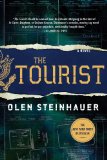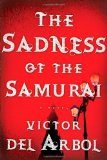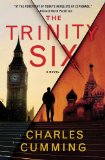Summary | Excerpt | Reviews | Beyond the book | Read-Alikes | Genres & Themes | Author Bio

You can tell everything you need to know about The Tourist in the first twenty pages. A body, a CIA agent, and a suitcase full of cash go missing in the first chapter. By the third chapter, Milo Weaver, spy extraordinaire, has uncovered all three, and has also caught the scent of the deeper conspiracy that prompted their disappearance. The Tourist is fast, slick, and gratifying, each short chapter like an episode of "Lost" or "24."
Weaver is a Tourist, a black-ops agent who "float[s] unmoored from city to city, engaged by transatlantic phone calls from a man he hasn't seen in two years." In the post-9/11 era, his role is not to burrow under geopolitical walls to undermine an opponent's power, but rather to flit across the globe committing precise, unseen deeds that force governments to act in the United States' interest. Weaver's seemingly disparate missions connect him to Islamic leaders in the Sudan, a French foreign minister, a Russian oligarch. At one point, dizzy from trying to hold everything in his head at once, Weaver asks his boss what the hell is going on. His boss tells him, "[T]he answer that gets the gold star is empire. And you get bonus points if you mention China."
This is a hugely ambitious book that tries nothing less than to sketch the new world order from the underside. Steinhauer maps the networks of global power by following the flow not of money but of information. Weaver's territory, though it spans the world, is a self-contained one: virtually all of his targets are other spies and virtually all of his missions seek to discover what they know and how they know it. Follow the spies and you find the real story of current events, not the shadow play that makes it into the newspapers.
Here's where I'm supposed to say that Milo Weaver is the perfect protagonist for a tour through the backstage of American's empire. World-weary, physically and mentally overextended, kept in the dark about the reasons for his secret operations, Weaver seems designed to represent the American public at the end of the Bush era. But honestly, I never really cared about Weaver. Steinhauer does not achieve enough psychological realism for him to be anything other than a vehicle for the plot. And honestly, the plot was fascinating enough that I didn't mind. Weaver's boss gives him another pearl of wisdom: "Spying, and in particular Tourism, is all about storytelling. After a while you collect too many layers. It's hard to discern story from truth." I was pleasantly submerged in Steinhauer's layers, eager to pick up the book each night and refresh my memory about which operative had just admitted to working for the other side, thus revealing the previous layer as false.
Steinhauer further mines the connection between spying and storytelling when Weaver justifies deceiving a superior: "I had to be elusive, because no decent intelligence agent believes anything she is told. The only way I could make you believe it was if you discovered it on your own, while thinking that I never meant to lead you to the truth." Alas, Steinhauer entirely misses the opportunity to structure his book along this same logic. The reader cannot discover the book's secrets on her own because they are so wildly implausible they cannot be anticipated.
In an interview with Publishers Weekly, Steinhauer cites plausibility as his biggest challenge, yet he has freely sacrificed this basic level of realism for the sake of a plot that zooms forward without pause (again, much like "Lost" and "24" do). Thus, one of the main villains is an assassin with a distinctive red beard which perennially shows up on surveillance footage, helpfully allowing Weaver to link his crimes together. A Company man goes rogue, but he leaves such a perfect trail of bloodstains and fingerprints, despite his training, that he is caught within thirty pages. Weaver's boss's boss, suspecting that one of his moles has fed him bad intelligence, instantly emails him to ask if he's been compromised. And agents are forever talking to one another, comparing notes on ongoing missions like journalists around a water cooler. These violations of rudimentary spycraft will drive some readers crazy, preventing them from suspending their disbelief. I somehow managed to notice all of the discrepancies without losing my interest in the overall conspiracy.
Yes, that's right, I gave Steinhauer a pass on both characterization and plausibility. Sometimes, a story is so good at granting you an alternative look at your own world that you tug and pull to make it fit just right.
![]() This review was originally published in The BookBrowse Review in March 2009, and has been updated for the
March 2010 edition.
Click here to go to this issue.
This review was originally published in The BookBrowse Review in March 2009, and has been updated for the
March 2010 edition.
Click here to go to this issue.

If you liked The Tourist, try these:

by Victor del Arbol
Published 2012
A betrayal and a murder in pro-Nazi Spain spark a struggle for power that grips a family for generations in this sweeping historical thriller.

by Charles Cumming
Published 2012
The most closely-guarded secret of the Cold War is about to be exposed – the identity of a SIXTH member of the infamous Cambridge spy ring. And people are killing for it…
Your guide toexceptional books
BookBrowse seeks out and recommends the best in contemporary fiction and nonfiction—books that not only engage and entertain but also deepen our understanding of ourselves and the world around us.